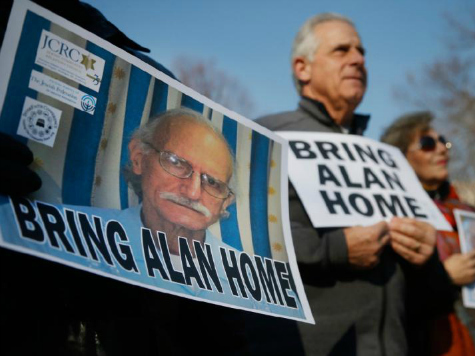In the wake of the Obama administration’s decision to trade five high-level Taliban officials to free Sergeant Bowe Bergdahl, the only Taliban captive in the American military’s history, those concerned about arrested USAID worker Alan Gross are beginning to ask why the White House won’t trade Cuban spies to free a U.S. citizen.
The State Department has faced many questions as to whether the Bergdahl case signals a paradigm shift in the way the United States deals with terrorists. Speaking on Monday, State Department spokeswoman Jen Psaki responded to questions about a potential swap for Alan Gross, a USAID worker currently serving a 15-year term in a Cuban prison for working to bring Internet access and cell phones to Cuban nationals, particularly the Jewish community.
“Nothing has changed” in that case, Psaki responded, emphasizing that “every circumstance is different” and that Bergdahl was captured in the theater of war. Bergdahl was captured by Taliban forces after apparently choosing to walk into Taliban territory and after sending hateful sentiments about the United States to his parents. Gross was arrested by the Cuban government after choosing to go on a humanitarian mission as a USAID subcontractor to help people have internet access.
Havana has demanded the release of five Cuban spies arrested in the United States for Gross’s freedom in similar fashion to the way the Taliban demanded its officials be released. That trade offer makes transparent the intentions of the Cuban government, and they have little to do with law enforcement: to use Gross, a civilian, as a bargaining chip in freeing its criminals within the United States.
That it takes a communist spy explicitly making a moral equivalency between the Cuban government and the Taliban to lay clear the fact that, as a state sponsor of terror, Cuba operates like a terrorist organization is but one irony of the situation.
“If they were willing to make this kind of exchange with the Taliban in Afghanistan, it makes no sense other than the lack of political will not to do the same with Havana to gain the release of the person jailed in Cuba,” Fernando Gonzalez, a Cuban spy sentenced to 16 years in the United States, told The Times of Israel.
Time and again regarding Bergdahl, Obama administration officials have repeated the same mantra: the United States does not leave its soldiers behind and will do everything in its power to return troops to their families safely. Whether Bergdahl broke the law by abandoning his battalion and putting his colleagues in danger, we are told, is a matter for American military justice now that Bergdahl is safe and sound.
The United States negotiated with the Taliban and members of the Haqqani network – terrorist elements in what some may describe as a failed state – to bring Bergdahl home. Make the hostage in question a civilian and change the failed state into a state sponsor of terror, however, and the United States will have to pass on saving an American. That is the message sent by the State Department’s dismissive attitude towards Alan Gross.
There appears to be little government activity to help find and free Gross, who has gone on a hunger strike once while in captivity. In May, four American lawmakers on a visit to Havana said they would see the conditions that Gross is currently in, but such a meeting did little to expedite any proceeding to free Gross.
The hunger strike and horrors of a Cuban political prisoner have taken a toll on Gross’s health, potentially a more visible one than that on Bergdahl, though the only way to know is if the Cuban government were as benevolent as the Taliban was in releasing a video of Bergdahl in January. The urgency present with Bergdahl is clearly lacking with Gross – perhaps because he is a civilian, or perhaps because the terrorists imprisoning him are only 90 miles away. In either case, the relative value of an American life is laid bare more transparently than ever after the Bergdahl swap, and what it means for the legacy of the Obama administration will depend on both the fate of Gross and the results of any investigations of Bergdahl.

COMMENTS
Please let us know if you're having issues with commenting.